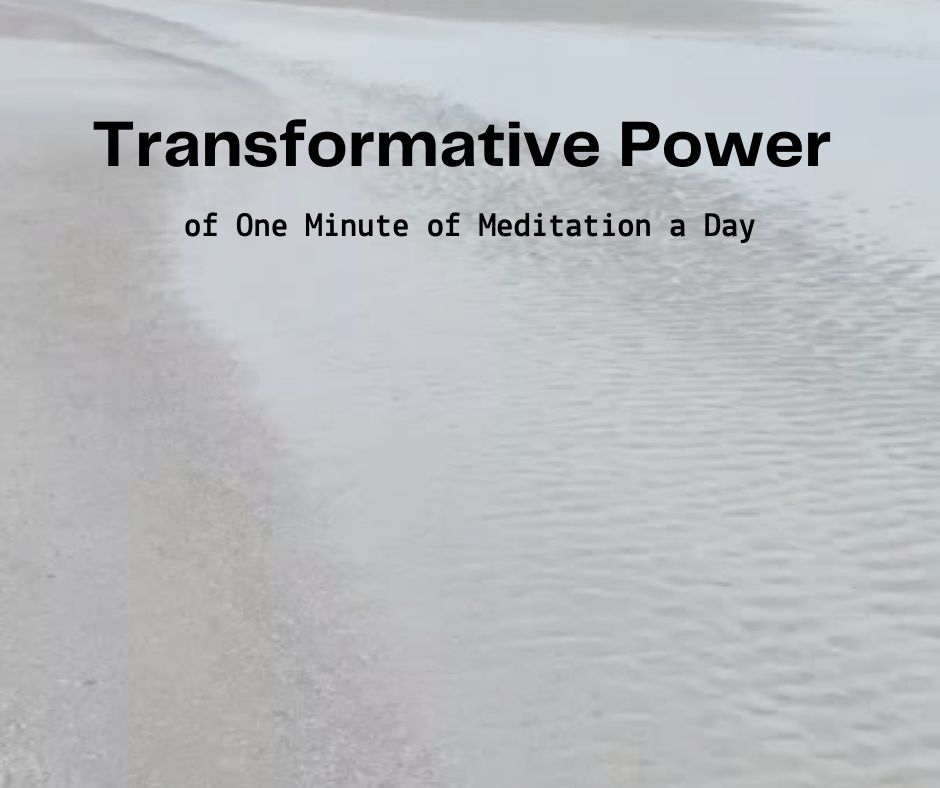The Transformative Power of One Minute of Meditation a Day

Incorporating a simple one-minute meditation exercise into your daily routine can have incredible benefits for your mental health. In this article, we will explore the transformative power of this short but powerful practice, its importance in today's fast-paced world, and how it can improve your overall well-being.
The Importance of Mental Health
Meditation is not a way of making your mind quiet. It is a way of entering into the quiet that is already there - buried under the 50,000 thoughts the average person thinks every day. - Deepak Chopra
Deepak Chopra's words beautifully capture the essence of meditation. In today's fast-paced world, our minds are constantly bombarded with thoughts, worries, and distractions. This nonstop mental chatter can take a toll on our mental health, leading to increased stress, anxiety, and even depression.
By dedicating just one minute each day to meditation, we create space for our minds to quiet down and reconnect with our inner peace. With regular practice, we can experience a myriad of mental health benefits, including reduced stress levels, improved focus and concentration, increased self-awareness, and enhanced emotional well-being.
The Science Behind Meditation's Mental Health Benefits
Mindfulness meditation is the embrace of any and all mind states in awareness, without preferring one to another. - Jon Kabat-Zinn
Jon Kabat-Zinn's words highlight the essence of mindfulness meditation, a practice that involves non-judgmentally observing our thoughts and emotions. Numerous scientific studies have shown that even short periods of daily meditation can lead to significant mental health improvements.
When we engage in meditation, our brain's circuitry begins to change. Research has found that regular meditation can enhance the prefrontal cortex, responsible for decision-making and emotional regulation, while reducing the activity in the amygdala, the part of the brain associated with fear and anxiety.
Furthermore, meditation has been linked to an increase in gray matter in areas related to attention, memory, and compassion. It strengthens the connections between different regions of the brain, leading to improved overall cognitive function.
Incorporating One Minute of Meditation into Your Routine
Just as our bodies are designed to feel good, our minds are equipped to experience calm and clarity. By setting aside one minute each day for meditation, you can begin to unlock this state of well-being.
The key is to find a quiet and comfortable space where you can sit or lie down without distractions. Close your eyes and bring your attention to your breath. Focus on the sensation of your breath moving in and out of your body. When your mind wanders, gently bring it back to the breath. Stay present in this moment for one minute, letting go of any judgments or expectations.
As you continue this practice, you may gradually increase the duration of your meditation sessions. But remember, even one minute of focused breathing and presence can make a significant difference in your mental well-being.
Overcoming Challenges and Building Consistency
The quieter you become, the more you are able to hear. - Rumi
Rumi's insight speaks to the deeper wisdom that arises when we quiet our minds through meditation. However, building a consistent meditation practice can be challenging, especially when faced with a busy schedule or a restless mind. Here are some strategies to help you overcome these obstacles:
1. Start Small: If committing to one minute feels too overwhelming, begin with just a few seconds of focused breathing each day. Gradually increase the duration as you feel comfortable.
2. Set Reminders: Use technology to your advantage by setting reminders or alarms on your phone to signal your daily meditation time. This can help you establish a regular routine.
3. Embrace Imperfection: You might experience moments of restlessness or difficulty in focusing during your meditation. Rather than judging yourself, remember that these challenges are simply part of the process. Be patient and compassionate with yourself as you navigate your meditation journey.
Making Meditation a Lifelong Practice
Every morning we are born again. What we do today matters most. - Buddha
Buddha's words remind us of the daily opportunity we have for personal growth and transformation. As you continue to dedicate one minute of your day to meditation, you'll likely start to notice positive changes in your mental health and overall well-being. To make meditation a lifelong practice, consider the following tips:
1. Seek Guidance: Explore different meditation techniques and styles to find what resonates with you. Attend workshops, read books, or listen to guided meditation recordings to deepen your understanding and enrich your practice.
2. Find Accountability: Join a meditation group or enlist the support of a friend or family member who shares your interest in meditation. Having someone to hold you accountable can help you stay on track with your practice.
3. Embrace Flexibility: While aiming for consistency is important, it's also essential to be flexible with your daily meditation routine. Adapting to life's fluctuations and adjusting your practice accordingly will ensure that meditation remains a sustainable habit.